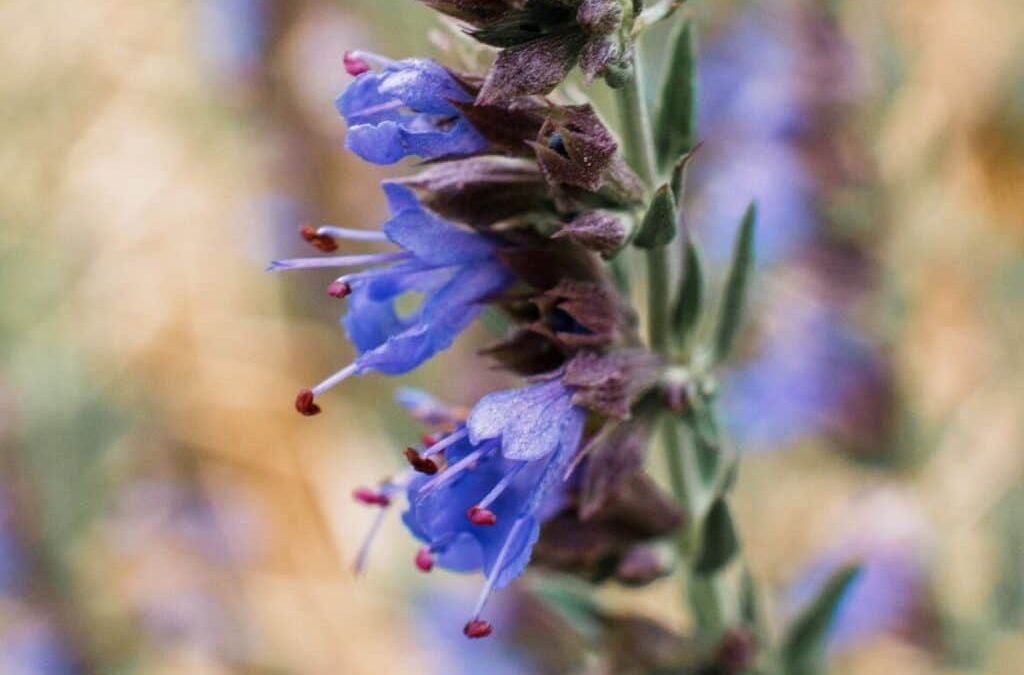Hyssop is an ancient herb that is an important part of the Western Materia Medica. This combination of information from ancient sources and the modern scientific model lends a unique perspective on this plant and how you can use it in your herbalism practice.
In today’s blog post, you’ll learn:
- The medicinal properties of Hyssop’s aromatic bitter taste
- Hyssop’s unique application as a cough medicine
- The psychological and emotional indications for Hyssop
- Its relationship to Jupiter and Mercury
- How to harvest and make medicine using Hyssop
I find it really exciting when you discover that an herb has Biblical and spiritual traditional uses because when this happens, you can glean insight into the plant in a way that modern science doesn’t speak to.
Hyssop is mentioned in Psalm 51:7, where King David writes “Purge me with Hyssop, so that I shall be clean. Wash me so I may be as white as snow.” This quote illustrates Hyssop’s seemingly cleansing effects on the body, mind, and soul.
Hyssop is an interesting herb with an affinity for nearly every part of the body, granting it a protective-like quality. Beginner friendly and with many medicinal indications, Hyssop is the perfect herb for you to get to know.
Common name: Hyssop
Latin name: Hyssopus officinalis
Family: Lamiaceae
Tastes: Pungent, Aromatic, Bitter
Affinities: Digestive, Respiratory, Liver, Kidneys and Urinary Tract, Cardiovascular/Circulation, Immunity/Febrile Mechanism, Female Reproductive
Actions: Carminative, Bitter Tonic, Expectorant (main action, primarily stimulant expectorant), Spasmolytic, Diaphoretic, Diuretic, Antiseptic
Energetics: Warming, Drying (long term), Moistening (short term), Stimulant
Taste
Hyssop is a unique plant in that it is both bitter and aromatic. Some plants in the Mint family, like Lemon Balm (Melissa officinalis) and Peppermint (Mentha × piperita), are strictly aromatic. Others, like Motherwort (Leonurus cardiaca), are straight bitter. Hyssop has both tastes, making it an aromatic bitter. You may find that your Hyssop tastes more bitter or aromatic depending on the individual crop yield, and this can change from season to season. Hyssop’s pungency is what grants it its “hot” feel and indicates its circulatory and warming effects on the body.
“Hyssop is stimulant, aromatic, carminative, and tonic. Principally used in quincy and other sore throats, as a gargle, combined with Sage and alum, in infusion sweetened with honey. Also recommended in asthma, coughs, and other affections of the chest, as an expectorant. The leaves apply to bruises, speedily relieve the pain, and disperse every spot or mark from the effect of parts.” ~ King’s Dispensatory
Affinities
Aromatic bitters, like Hyssop, pretty much always have an affinity for the digestive system. Hyssop supports healthy digestion by stimulating secretions from the gastrointestinal tract (bitter), increasing blood flow to the gut (aromatic), and enhancing digestion and nutrient absorption.
Another core affinity of Hyssop is the respiratory system. It soothes the throat and opens the bronchial passages and lungs to support respiratory health. As a pungent herb, Hyssop increases circulation and impacts the cardiovascular, immune system, and febrile mechanism, which refers to the entire physiological process of how herbs work with a fever.
Hyssop has been used for liver stagnation patterns and jaundice and is known to promote diuresis. In this way, it influences the kidneys and urinary tract. Hyssop also has a slight affinity for the female reproductive system. Because of its circulatory stimulant properties and warming effect, it can be helpful for amenorrhea.
Hyssop has historical accounts of being used for nearly every organ system in the body, but the core organ affinities are digestion and respiration, and this is where you will see its actions really shine.
Actions
With its volatile oil compounds, Hyssop acts as a carminative by dispelling gas, wind, and bloating from the GI while driving blood flow to the gut. As a bitter tonic, it stimulates pancreatic enzymes, stomach acids, and the stimulation of bile through the liver and gallbladder. These digestive secretions help your body to digest your food better, absorb the nutrients, and prepare it for healthy elimination.
Hyssop is a choice stimulant expectorant herb because its warming property stimulates the lungs and the cough reflex to remove stagnant mucus. This herb is specifically indicated for when excess heat in the tissues has caused the mucus to “bake down,” causing it to adhere to the respiratory tissues and making it difficult to cough out.
It provides relief for this type of cough in two ways. First, its volatile oils penetrate the mucus, break it up, and make it easier to expel. Secondly, it increases secretions in the lungs through its bitter action, which helps moisten overly dry tissues. These fresh secretions introduce antibodies and immunological factors to the local area, which ultimately helps your body fight infection.
Although Hyssop is drying when used long-term, it has a short term moistening effect. For this reason, it is indicated for a hoarse voice, dry cough or throat, and lung conditions where mucus has lost moisture, sticks to the respiratory tissues, and is difficult to cough out. On top of this, it’s an excellent spasmolytic, relaxing tension in the bronchioles in asthmatic coughs, wheezing, and irritable spasmodic coughs.
Hyssop is a classic fever remedy, especially when accompanied by respiratory conditions. Hyssop stimulates diaphoresis, which makes the body sweat and drives heat from the core out to the periphery. It has long-traditional uses for febrile conditions like scarlet fever, measles, and typhoid fever. Although these are less prevalent today, you can think about how this may apply to modern-day conditions like COVID. While new variants display different symptoms than the original, Hyssop would have been indicated for that lingering dry cough so many people experienced after the infection had passed.
Energetics
Hyssop is a net-warming plant with a slightly moistening effect in the short-term and drying effect in the long term. Bitter herbs like Hyssop induce secretions that temporarily offer moisture to the tissues. However, they also drain fluids, which dries you out over time. You can see this dynamic in how Hyssop is indicated for a dry cough because of its moistening effects but is drying if you take this herb daily. This herb is not notably astringent or tonic in its influence on tissue tone and structure. In a different category altogether, Hyssop has a stimulant effect on the body energetically and drives circulation and activity.
According to Ayurveda, Hyssop decreases vata and kapha while elevating pitta. The warming and drying attributes make it particularly helpful for kapha, which is prone to patterns of excess cold. Since pitta runs hot and is prone to excess heat and Hyssop is a warming herb, it is not recommended for them. It helps warm the coldness and relaxes the tension of excess vata.
Because Hyssop is so warming and stimulating, it balances the cold/depression tissue state. This is characterized by patterns of hypoactivity, low-functioning organ systems, and decreased vitality. It may seem counterintuitive to use Hyssop in cases of fever since it is so warming, but consider many diaphoretic herbs are warming, such as Ginger (Zingiber officinale). In that way, you can see that Hyssop is used for symptoms of heat or inflammation that arise from deeper patterns of cold/depression. As it stimulates the depressed tissue state beneath, it alleviates heat-like symptoms that surface as a vital response to cold. It’s also quite useful for the wind/tension tissue state, particularly in the respiratory tract.
Psychological and Emotional Aspects
David Dalton, a flower essence practitioner, shares that Hyssop is for people who struggle with internalized feelings of shame and punish themselves for feeling “unclean.” They feel like they don’t deserve good things in life and may fear punishment– whether from a person or God.
With references to Hyssop’s spiritual and cleansing uses in the bible and psalms combined with its whole-body support, it seems to have an overall cleaning effect on the body, mind, and soul.
Alchemical Correspondences
Culpeper placed Hyssop under the rulership of Jupiter, which isn’t a very obvious correspondence to me. Perhaps he drew this conclusion because Jupiter is known as the great benefic, and confers an innate protection wherever it resides in your natal chart. With Hyssop’s effect on nearly the entire body and working as a constitutional slightly purifying herb, you can see how it has an overall Jupiter-like protective effect on your health.
That said, I tend to think of Hyssop as a mercurial plant. Its slender and thin morphology combined with its upward growing pattern alludes to a Mercury, and its aromatic property and actions attributed to its volatile oils are distinctly mercurial too, especially when coupled with its bitterness. Its primary affinity for the respiratory tract is clearly a Mercury correspondence as well, being the primary organ system governed by this planet, as well as its usefulness as a spasmolytic and easing the wind/tension tissue state.
Hyssop has several indications that place it under the Fire Element. Morphologically, the leaves are lance-shaped and come to a nice pointed tip. You can see further correspondences with Hyssop’s dispersive and stimulant actions. It also has the warming property indicated for patterns of cold, which is a natural Fire Element attribute.
Growing Hyssop
Hyssop is a vibrant plant that is easy to grow and flourishes with minimal effort. Like many plants in the Mint family, this herb tends to take up on its own once you plant it. If you doubt your green thumb capabilities, this is a good plant to begin with as are many of its mint family relatives.
You can germinate Hyssop by seed, sow it in flats, and plant them in the springtime. Hyssop is a wonderful plant for pollinators, and you can expect it to attract the butterflies and honeybees enjoying the pollen of the vibrant purple flowers. Hyssop is a straightforward plant and a good one to have in your garden.
Preparation
Harvest Hyssop fresh and strip the aerial leaves from the stems while in flower to make medicine. It tinctures well, fresh, with 60% alcohol. You can use the tincture by itself, in a larger formula, or as the base for a cough syrup. If you prefer to use the dried plant, harvest the aerial parts, dry them, and use them in teas later on throughout the year. The dried leaves are best tinctured at 40-50% alcohol.
It’s exciting to find biblical references to herbs used in today’s Materia Medica. As much as you can learn about herbs from a biomedical perspective and study their chemical constituents, these ancient references offer you insight into the spiritual and traditional uses of a plant that science can’t speak to. With a holistic understanding of Hyssop, you can now use it in your practice to benefit your heart, mind, body, and soul.
Formula
Stimulant Expectorant Tincture Formula
25% Osha (Ligusticum spp.)
25% Elecampane (Inula helenium)
20% California Spikenard (Aralia californica)
20% Hyssop (Hyssopus officinalis)
10% Licorice (Glycyrrhiza glabra)
This formula combines 4 pungent, hot, and aromatic stimulant expectorants that are excellent for wet, boggy, mucus laden coughs. The oils and resins of Elecampane, Osha, California Spikenard and Hyssop will help disperse stagnant phlegm, lift it up from the mucosal membrane, and stimulate a more productive cough. These stimulant expectorants are balanced with the soothing and demulcent Licorice, which prevents the formula from being too dry on the respiratory tissues, especially as moisture energetics tend to change rapidly in acute respiratory conditions.
The post appeared first on .




